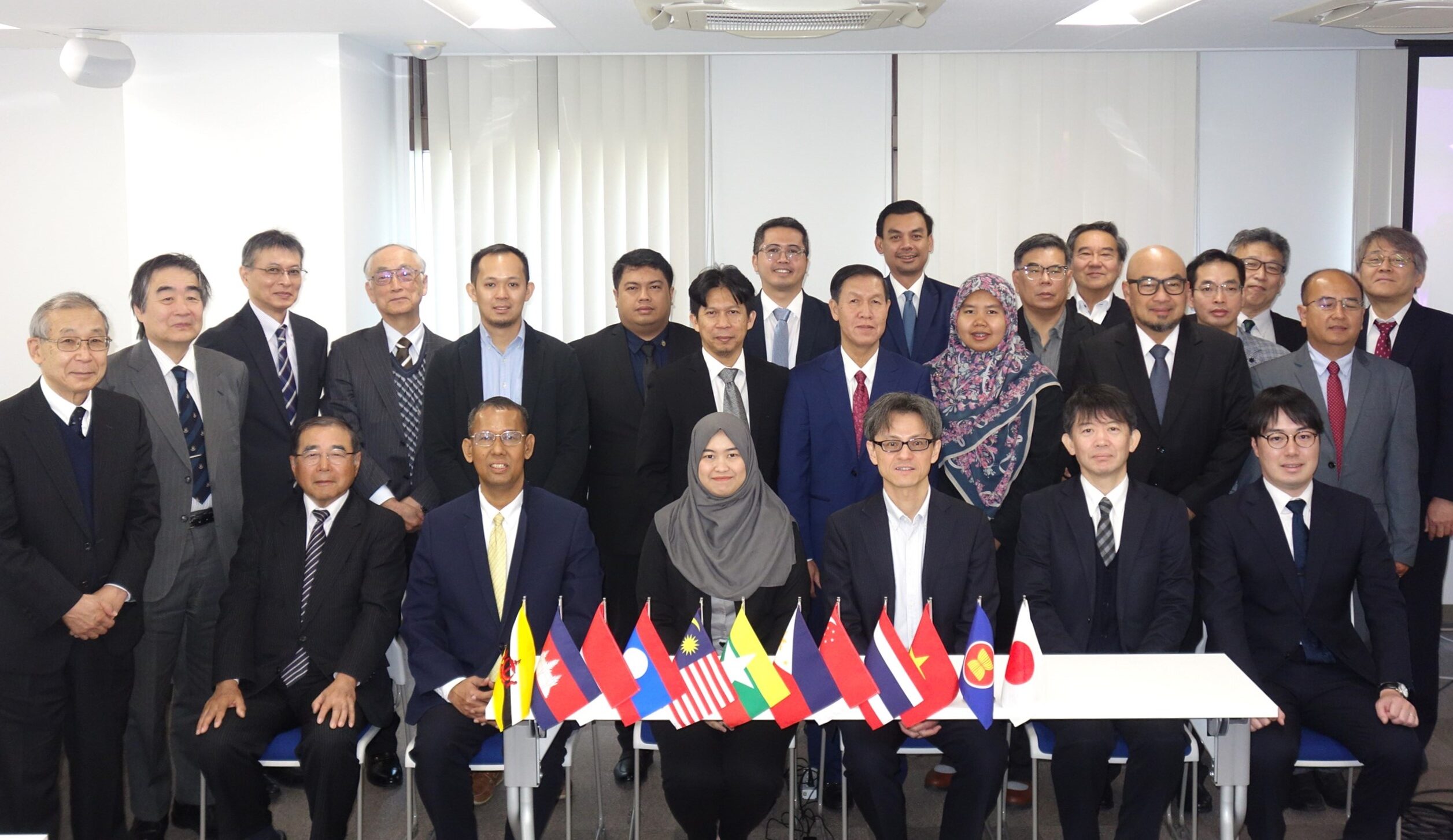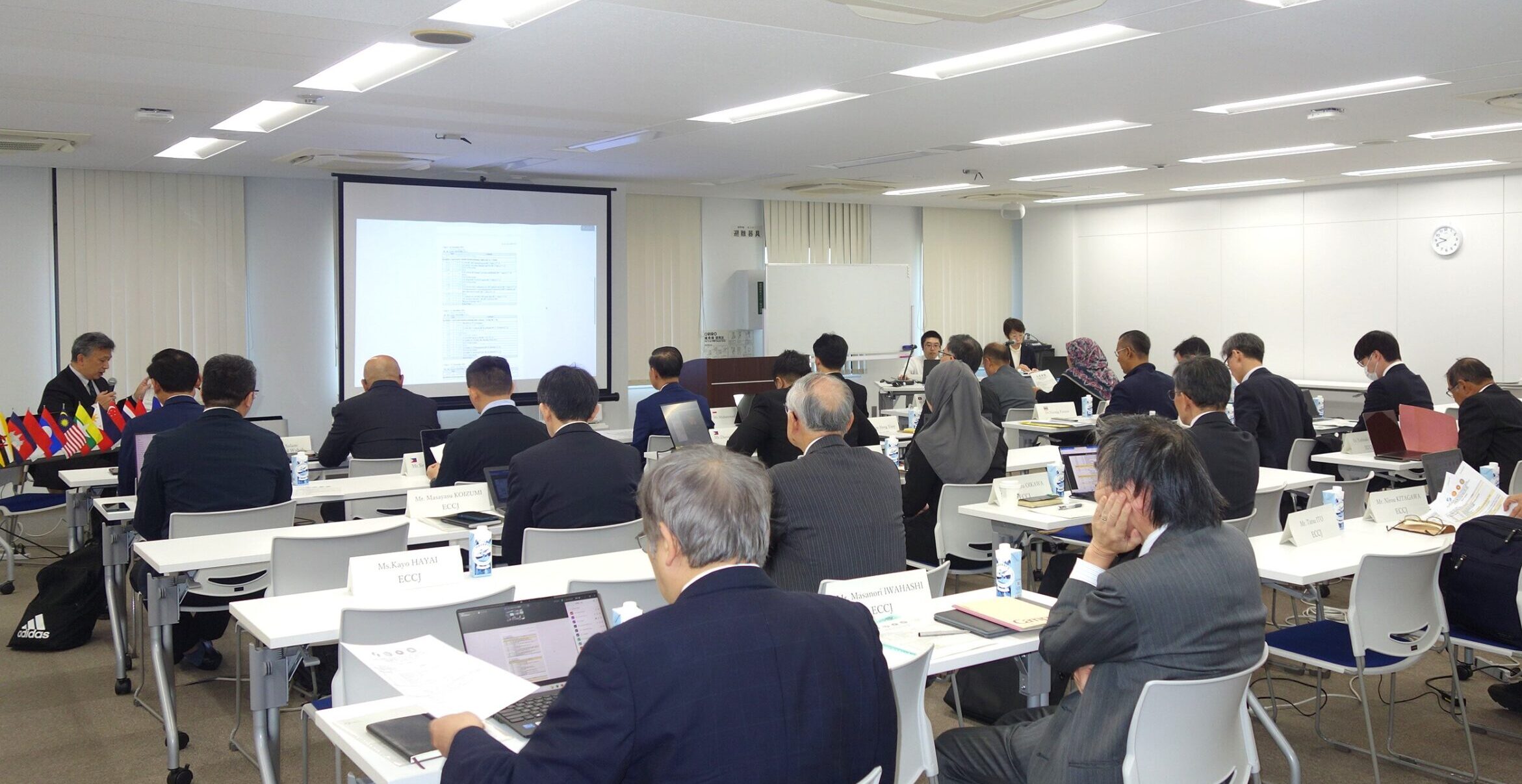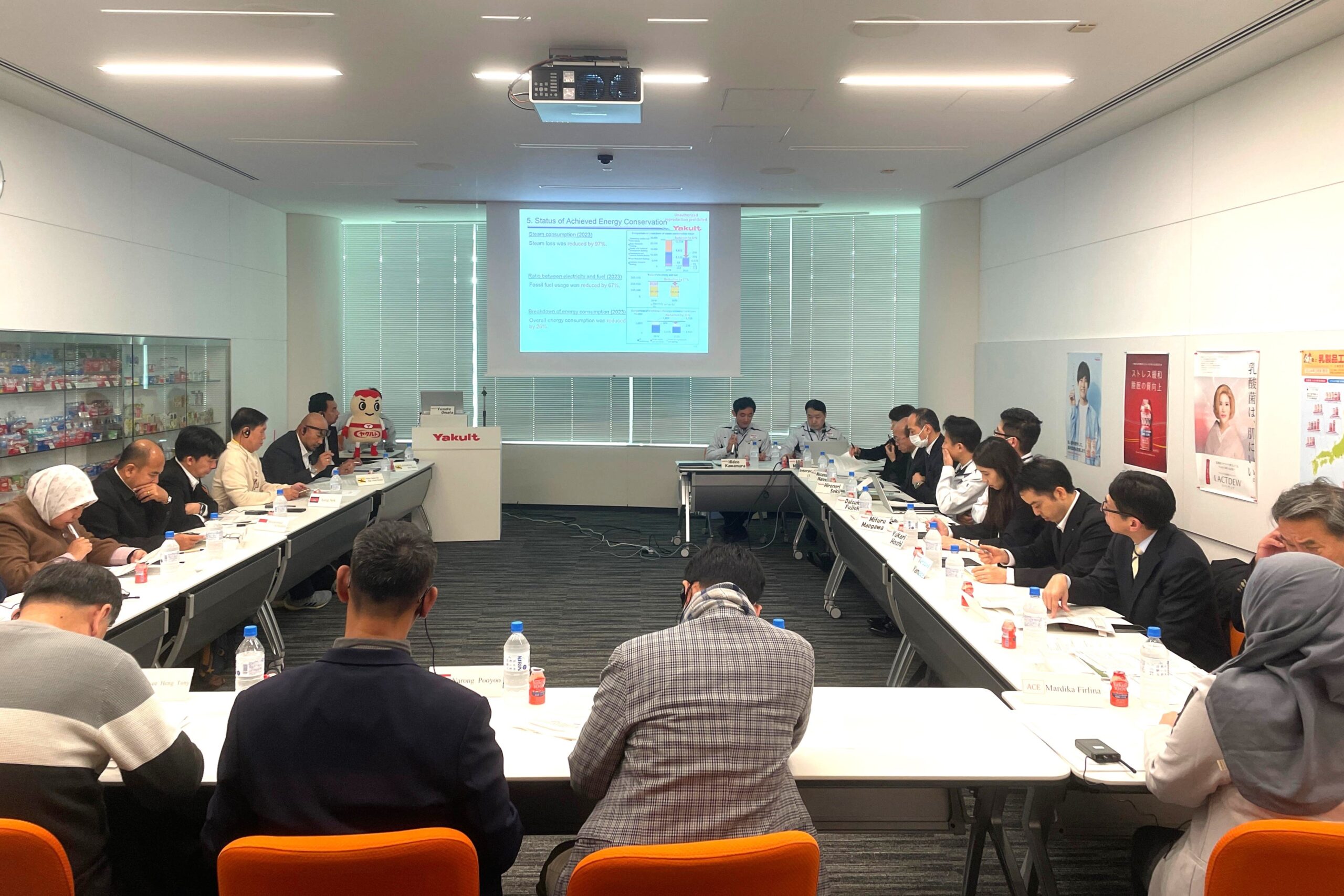Menu

Photo 1. Participants of ECAP35 on SAEMAS
The ASEAN Centre for Energy (ACE), in collaboration with the Energy Conservation Center Japan (ECCJ), co-organised the 35th Energy Conservation Workshop under ASEAN-Japan Energy Efficiency Partnership (ECAP35) from 9 to 13 December 2024 in Tokyo, Japan. The Workshop was attended by representatives from ACE, ECCJ, and nine (9) ASEAN Member States (AMS) – Brunei Darussalam, Cambodia, Indonesia, Lao PDR, Malaysia, Philippines, Singapore, Thailand, and Viet Nam.
ECAP35 is a capacity-building workshop focused on developing Common Standard Modules (CSM) and Advanced Modules (AM) for the Sustainable ASEAN Energy Management Certification Scheme (SAEMAS). This 5-day Workshop aims to gather AMS policymakers and the SAEMAS working group to discuss SAEMAS training materials, including textbooks, exams, and evaluation criteria. The Workshop also focuses on planning the trial of a Common Stand ard Energy Manager (CSEM) in 2025 and developing an operational system plan for SAEMAS following its launch as an ASEAN energy manager certification system, anticipated in 2026.
The Workshop commenced with a keynote lecture delivered by the Ministry of Economy, Trade and Industry (METI) of Japan, outlining policy targets in Japan’s energy policy, focusing on the safety, energy security, economic efficiency, and environment simultaneously (S+3E). This was followed by a presentation by Mardika Firlina, Associate Officer of the Energy Efficiency and Conservation (CEE) Department at ACE, who shared updates on the ASEAN Plan of Action for Energy Cooperation (APAEC) 2016-2025 Phase II: 2021-2025 and the SOME-METI work program, including updates on the progress of the AJEEP program in fiscal year 2024, which currently encompasses two schemes, Scheme 4 and Scheme 5.

Photo 2. ECAP35 Lectures Session
Subsequently, representatives from each ASEAN Member State (AMS) presented their respective national policy and legal frameworks on Energy Efficiency and Conservation (EE&C) for energy management systems and energy manager certification, highlighting potential gaps and challenges in implementing SAEMAS at the national level.
The second day of the Workshop primarily focused on the SAEMAS Common Standard Module (CSM) training program, comprising three components: Lecture-style Training, Practical Energy Manager Training, and Energy Audit Practice. Through in-depth discussions between ECCJ, ACE, and AMS, the content of the textbook, examination questions, participant requirements, and crucially, the procedures and timelines for two distinct SAEMAS CSM Trials in 2025 were assessed. The first half of 2025 will focus on the CSEM trial targeting graduates of ASEAN AJEEP Trainers (AAT) from 2019 to 2021. The second half of 2025 will focus on those certified as energy managers/auditors by the national system. All trials will be conducted fully online.
On the third and fourth days, participants discussed the SAEMAS Advanced Module, designed to develop and create experts in the field of Carbon Neutral (CN) technology and projects. The discussion encompassed its objectives, qualification grants, and participant eligibility criteria. Furthermore, the session delved into an assessment of the lecture training content, including textbooks and exam questions. Some of the modules discussed included CN Policy & CN Management, Advanced EE&C & CN Technologies, and CN Project for Factory & Building.

Photo 3. ECAP35 Visit to Azbil Fujisawa Technology Center
In these two days, participants were also invited to visit the Azbil Fujisawa Technology Center, located in Fujisawa-City. This facility serves as Azbil’s R&D centre, pioneering next-generation production, focusing on developing technology across three key areas: Building Automation (BA), Advanced Automation (AA), and Life Automation (LA). These areas encompass components like sensors, switches, field devices, and automatic control valves, to address customer challenges.

Photo 4. ECAP35 Visit to Yakult Central Institute
The second site visit was to the Yakult Central Institute in Kunitachi-City, which has principles for developing food, pharmaceuticals, and cosmetics that utilise beneficial microorganisms and have biological regulatory functions. Their main research focus and fields are research into material development and applications for foods, cosmetics, and pharmaceuticals that are useful in maintaining and promoting people’s health. During the visit, Yakult Central Institute provided lectures on their initiatives for energy efficiency and conservation implemented within their company.

Photo 5. Lectures Session at the Yakult Central Institute
The final day concluded with presentations by Mardika Firlina from ACE, outlining the operating system and business model for SAEMAS towards its implementation, estimated to start in 2026. While SAEMAS offers a comprehensive opportunity and benefits for various stakeholders, including training providers, energy managers, and industries, driven by increasing demand for energy efficiency, challenges were also discussed. Mardika underscored the necessity of three key elements for successful national-level SAEMAS adoption, namely a robust regulatory framework, market readiness, and strong stakeholder engagement and capacity building. She also emphasised that SAEMAS is designed to complement, not compete with, the National Certification Programme.

Photo 6. Presentation by Mardika Firlina, Associate Officer of CEE at ACE
AJEEP, as part of the ASEAN Senior Officials Meeting on Energy and Japan’s Ministry of Economy, Trade and Industry (SOME-METI) Work Programme for 2024-2025, is a regional cooperation initiative between ASEAN and Japan, implemented by the ACE and ECCJ with financial support from METI. This partnership aims to strengthen the capacity of AMS and reduce disparities in EE&C policies and practices. Starting 2022, AJEEP entered into new Scheme 4 and Scheme 5. AJEEP Scheme 4 aims to support the establishment of the SAEMAS. AJEEP Scheme 5 focuses on capacity building on advanced carbon neutrality technologies and systems to improve EE in industry, building, and transportation. ECAP itself began in 2012 as a capacity-building initiative for EE&C in AMS.
